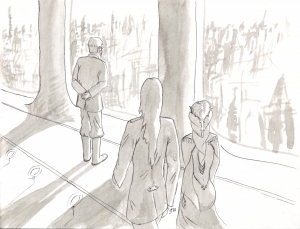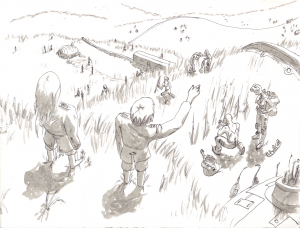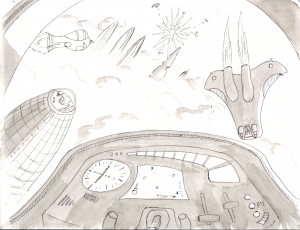In this scene, Davi and his Squadron of worker pilots take on the Boralian Alliance forces on their own soil, fighting for their freedom against the oppressive regime. One of several battle scenes from the last part of the book, although there are action sequences throughout.
Davi pushed the joystick forward and his his VS28 fighter dove out of the cloud cover to rejoin the rest of his squadron. As he slid into the pole position, he glanced over at Tela in position off to his right. She smiled and waved.
“Imagine seeing you here,” he said over the comm-channel with a smile.
He heard Tela laugh as the squadron formed up around them, doing so without the usual chatter. Davi knew they were all as tired as he was.
His comm-channel beeped. “Squadron One, commander,” he answered.
Uzah’s yelling voice came through, struggling to be heard over at the explosions and laser blasts in the background. “Squadron One, we request immediate response. We have enemy forces pinned down on the east edge of the government complex. Please intercept vehicle traffic.”
The Alliance had been making use of Shuttles and Floaters to launch attacks and move troops around. His pilots strafed enemy launch sites as well as ground craft.
Davi keyed the comm-channel transmit button. “Roger, Ground Leader, ETA six minutes.” Davi ran down the pilots’ various skill levels and successes, devising a strategy he hoped would work. It all depended on the actual positions and activities of the enemy once they arrived.
The fighters glided over the tops of the buildings at close range, staying low to confuse the radar and maintain good line of sight with the ground. Davi divided the squadron into two groups of six fighters, assigning Tela to head the second group. “You go after ground weaponry emplacements first. We’ll try and take out any vehicle traffic.”
“Roger,” she said. They exchanged one last look before steering their craft apart as their assigned groups formed up around them. Then each group vectored off toward their target areas.
A few minutes later, the government center came into view. Two columns of large Floaters moved up parallel corridors, attempting to flank the WFR forces. Their dark blue coloring made them hard to spot through the smoke on the ground but the shiny Alliance emblems reflecting light on both sides gave them away.
“Dru and Virun, form behind me. We’ll take the group to starboard. The rest of you form behind Jorek and take the group to port.”
“Roger,” the pilots responded in unison as they split into subsquads.
Davi smiled, remembering when Jorek and Virun had pulled him aside after the air raids on the enemy starports.
“We owe you an apology,” Virun had said.
“We’re sorry we gave you such a hard time,” Jorek said. “It was just hard to believe we could trust you.”
Since then, they’d become two of his strongest leaders.
“Go for their weapons capabilities first,” Davi instructed.
“Ah come on, boss! Total destruction is much more satisfying,” Jorek said over the comm-channel.
“You can destroy them after you’re sure they can’t fire back,” Davi said, knowing that despite his enthusiasm, Jorek’s focus never waivered.
“You got it,” Jorek responded, not big on comm-channel protocol.
Both squads executed the plan perfectly, swooping in on the Floaters from above, strafing them with laser fire. Outside his cockpit, multiple flashes appeared followed by booming explosions as Davi’s blasts disabled the front vehicle in the column. The next Floater in line swerved to avoid it, but the driver misjudged his position, running over troops fleeing the first Floater to seek cover, before crashing into the third Floater in line.
“Three down with one shot, not bad,” Davi said to himself. He adjusted his targeting and fired again, this time aiming for the laser cannons on the three Floaters. He shifted in his seat as the VS28 vibrated with each blast. The cockpit started feeling stuffy as the temperature rose along with his excitement and adrenaline.
Laser bolts flashed outside his blast shield. Spotting rooftop snipers, he didn’t even bother to dodge. Blasters wouldn’t do much good against the VS28’s shields even at close range. He circled around and watched Dru and Virun dispatch laser cannons on four more Floaters. Several more bright explosions boomed before the Floaters split up onto separate corridors in an attempt to avoid their fire.
“They’re trying to keep it interesting for us, boys,” Davi said over the comm-channel.
“Good. Moving targets are so much more fun,” Dru responded. To Davi’s amazement, Dru had become one of the better target shooters among the pilots.
Davi and three others swooped down in tight formation and fired. Laser blasts exploded around the Floaters again. Davi’s and Dru’s blasts hit their marks, taking out more laser cannons. Virun’s missed, but he aimed again and blasted the Floater’s engines, bringing it to a sudden stop.
Troops jumped clear, seeking cover as Virun chuckled over the comm-channel. “That had to hurt.”
Virun’s fighter rocked with an explosion and orange flashes appeared on its port wing. “What the—”
Davi looked over to spot a laser cannon zeroing in on him again from the top of a nearby building. “Laser cannon, top of the Acron Industries building. I’m on him,” Davi said over the comm-channel. G-forces slammed him back against his leather seat as he put his VS28 into a steep turn and dove down, targeting the rooftop of the office complex.
Jorek’s voice came over the comm-channel. “Keep your eyes out for laser cannons on the rooftops.”
“How’d we miss those?” Dru wondered aloud over the comm-channel.
“Keep your eyes peeled for others. He really did some damage,” Virun warned them.
Davi’s targeting computer lit up as it locked on the target. Lining up visually on the guides, he strafed the rooftop. Alliance soldiers dove to each side as the laser cannon exploded. “One cannon down.”
“Thanks, boss,” Virun replied as Davi steered into position above Virun and to the right.
Virun’s starboard wing had black burn marks from the impact and a tear in the metal. “The damage doesn’t look unmanageable from here. Can you still control her?”
“I’m not out of this yet,” Virun replied turning the fighter for another run.
Davi and Dru both maneuvered into formation around him. Without further chatter, knowing what to do, they took out the laser cannons on the four remaining Floaters, and then targeted their engines.
As they circled around, Davi glimpsed Jorek’s squad making similar runs. In a few more minutes, the remaining Floaters had been disabled and the squadron reformed around Davi, heading to assist Tela’s team. Davi brushed his clammy brow against the sleeve of his flight suit.
They arrived at the government center to find charred remains of more laser cannons and Alliance equipment. One of the barracks was smoldering. In the beginning, the WFR had hoped to preserve as much infrastructure as possible, but Alliance resistance had made it so difficult they’d decided to do what must be done and worry about it later. They could always rebuild.
“Leave anything for us?” Jorek said as they circled Tela’s team.
“We were about to ask you the same question,” Tela responded as she joined their formation. The rest of her team formed up behind her.
A squadron of seven Alliance VS28 fighters appeared heading straight for them with laser cannons blazing. “Heads up, here they come!” Tela called into the comm-channel.
Davi spun his fighter into a dive as two laser blasts exploded off his starboard wing. “We need to capture that starport.”
“Let’s knock these boys out of the sky!” Brie said over the comm-channel.
Davi chuckled. She’d come a long way from the lost teenage girl he had known in training. Davi glanced over to see one of his fighters crashing into the top of another office building, as the Squadron divided itself into pairs and began targeting the enemy fighters.
“We lost Kinny,” Tela said over the comm-channel.
Davi pounded a fist into the side of his fighter. Kinny was an experienced pilot who had joined after the initial attack. “Wingmen, cover your leaders!” They didn’t really need the reminder, but losing one of his pilots switched him into teacher mode again.
Tela lined up on an Alliance fighter and unleashed a burst of fire from her cannons. The enemy fighter exploded, spiraling toward the ground. Tela let off a victory yell, “One down!”
Davi lined up another in his sights, firing several sloppy blasts through its wing. It spun out of control. “Make it two.”
An enemy fighter swooped in from above, firing on Dru at close range. Explosions rocked the hull of his fighter.
Smoke trailed from it, and Davi could see the damage out his blast shield. “You okay, Dru?”
Dru sounded rattled. “She’s a little shaky but I can still fly her.”
Davi and Tela both dove in to provide cover, blasting in unison at the enemy fighter trying to escape. It disintegrated with a bright flash.
Dru’s voice rose in excitement. “He won’t do that again! Thanks, guys!”
“Don’t mention it,” Tela said.
“Let’s clean this mess up!” Jorek said.
Davi watched as the enemy fighters retreated. “They’re running,” Nila said.
“Jorek, take the squadron and chase them down if you can. We’re escorting Dru back to base,” Davi said.
“You got it, boss,” Jorek said.
“Don’t let them lead you too close to the starport. They might launch reinforcements,” Tela warned.
“Don’t worry. We’ll be okay.” Jorek said as the others formed around him and peeled off after the enemy fighters, leaving Tela and Davi flanking Dru.
“I don’t know about the rest of you, but I’m hungry,” Dru said.
Davi heard Tela’s laugh over the comm-channel as he keyed the transmitter. “Let’s go home.” They flew in formation back toward the WFR base.
326 pp · ISBN 978‐0‐9840209‐0‐4 ·Trade Paperback/Epub/Mobi · $14.95 tpb $3.99 Ebook · Publication: October 4, 2011 · Diminished Media Group
Available now for 20% off on preorders!!!
Trade paperback only
EPUB or MOBI — please specify in notes on order
 This episode is brought to you by MAYAN DECEMBER, the exciting new science fiction novel from Brenda Cooper.
This episode is brought to you by MAYAN DECEMBER, the exciting new science fiction novel from Brenda Cooper.






 I have never written fanfic and I long ago stopped even attempting to read it. Like many, I sought out fan fiction as a way to get more time with characters and in worlds I’d fallen in love with. My hopes were high for a new escape and recapturing all the emotions I felt when I read the original. Unfortunately, I found that most fanfic is a poor imitation. Are there talented writers writing fanfic? Yes. But it’s not my point that no talent exists in the pool. Some even practice their craft and develop it writing that. I get it. But from quality and style to plotting and other factors, a majority of it, in my experience, just isn’t the same, and, frankly, all too much of it was just not good at all. But on top of that, I always had doubts because of an inner belief that it’s not legitimate. And although I’ve not written anything popular enough to inspire such imitation, I’ll respond as if I had, because this is pretty much how I’d feel if it happened that way.
I have never written fanfic and I long ago stopped even attempting to read it. Like many, I sought out fan fiction as a way to get more time with characters and in worlds I’d fallen in love with. My hopes were high for a new escape and recapturing all the emotions I felt when I read the original. Unfortunately, I found that most fanfic is a poor imitation. Are there talented writers writing fanfic? Yes. But it’s not my point that no talent exists in the pool. Some even practice their craft and develop it writing that. I get it. But from quality and style to plotting and other factors, a majority of it, in my experience, just isn’t the same, and, frankly, all too much of it was just not good at all. But on top of that, I always had doubts because of an inner belief that it’s not legitimate. And although I’ve not written anything popular enough to inspire such imitation, I’ll respond as if I had, because this is pretty much how I’d feel if it happened that way.